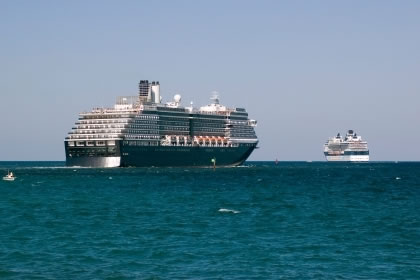Facts About New Zealand
Capital city: Wellington
Area: 103,738 sq miles [Source: Wikipedia.com]
Population: 4.2 million [Source: Lonelyplanet.com]
Most popular destinations: Auckland, Wellington, Rotorua, Abel Tasman National Park, Hobbiton, Otago wine region, Queenstown snowfields
Time zones: GMT/UTC +12 (New Zealand Standard Time) used on the main islands. Chatham Standard Time (CHAST) is used on the outlying Chatham Islands. It is 12 hours and 45 minutes ahead of UTC. New Zealand observes daylight savings during summer, when clocks are advanced one hour.
Language: English is the official language, spoken by 98% of the population. [Source: Wikipedia.com]
Religion: 55.6% Christian, 2.2% Buddhist, 2% Hindu, 0.9% Ethnoreligionist (traditional Maori) [Source: Wikipedia.com]
Currency: New Zealand Dollar (NZ$)
Electricity: 230V 50Hz [Source: Wikitravel.com]. As in nearby Australia, power sockets have two flat angled slots and one vertical one. Travelers are advised to purchase a plug adaptor and voltage converter before they leave their country.
Dates: Written in the format day/month/year
Country dialing code: 64
Telephone numbers: New Zealand telephone numbers beginning with 0508 and 0800 are toll-free. New Zealand telephone numbers beginning with 08 are charged at the local rate. New Zealand phone numbers beginning with 0900 are pay-for-service lines. These incur charges at a premium rate.
Emergencies: Dial 111 from any telephone in New Zealand to contact police, ambulance and the fire department in an emergency. This is a free call service, so there is no need for coins.
Telephone assistance: Dial 018 for national directory assistance and 0172 for international assistance from any telephone in New Zealand.
Maps: Available from i-SITE tourist information centers in major towns and cities. It is also possible to buy a New Zealand chip for a GPS system, or even hire a GPS system, from New Zealand’s international airport.
Business hours: General business hours (including banks and post offices) are 9 am to between 4:30 and 5:30 pm from Monday to Friday. Stores tend to trade late on Thursday or Friday nights (depending on the area). Almost all stores are open on Saturday mornings, and many trade on Sundays. All businesses close on Christmas Day, Easter Sunday, and ANZAC Day morning (April 25).
Taxes: A Goods and Services Tax of 12.5% is built in to the price of many goods and services. Some stores, especially in tourist destinations, will ship goods to the overseas homes of customers to avoid this tax as export goods are not subject to GST. Tourists can claim GST back on items valued more than $700 at their time of departure providing they retain receipts. Some establishments, such as cafes and restaurants, also apply a holiday surcharge of approximately 15% on public holidays.
Internet access: Available throughout most of the country. Most towns have cyber cafes which allow customers to use computers provided or their own laptops. Many public libraries also have public internet access available for a small hourly fee. Vouchers for Wi-Fi access are available at Starbucks cafes and other establishments. Free internet access is available in the main airports and many hotels.
Newspapers: The New Zealand Herald is New Zealand’s leading national daily newspaper. This newspaper also publishes several smaller newspapers which give greater coverage of local news items.
Pets: While pets from many Western countries do not need to be quarantined, they are not permitted to go out and socialize with the public for 30 days after arrival. For this reason, travelers are advised to leave their pets at home.
Tipping: Tipping is not customary or expected in New Zealand, and may be refused by some establishments.
Water: The quality of water is acceptable to drink throughout New Zealand. However, some town supplies are drawn from river water and then chlorinated. While this is safe to drink, it is not to all tourists tastes. Bottled water is available in many stores.
Alcohol: Persons under the age of 18 are not permitted to purchase alcohol, however there are no laws to stop minors drinking alcohol. Alcohol is sold in pubs and liquor stores, called “bottle shops.” Supermarkets and convenience stores sell beer and wine, but not hard liquor. Drivers must have a blood alcohol level less than 0.08%. Police used random breath tests to enforce this. It is also an offence to drink alcohol in designated liquor ban areas, including city centers and some beaches at various times of the day.
Smoking: Minimum smoking age is 18. Smoking is banned in most public areas, including shopping centers, pubs, restaurants, and public transport.
